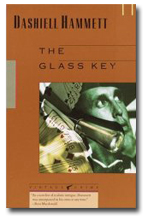Books |
The Glass Key
Dashiell Hammett
By
Published: Nov 18, 2020
Category:
Mystery
"The Glass Key," published in 1930, was Dashiell Hammett’s favorite book — quite a statement when you consider that he also wrote "The Thin Man" and "The Maltese Falcon."
“The clues were nicely placed there,” he explained, “although nobody seemed to see them."
He’s right. “The Glass Key” is a cleverly plotted novel, with more than its share of plot twists and turns. It’s got a love triangle of sorts (and even a risqué scene that will fuel a fantasy some cold night). And in its style, it’s quite innovative: We’re never told what the characters think. Instead, we have to figure out their motivations from their actions — and in addition to the expected sharp dialogue, there’s plenty of rough-and-tumble action in these 214 pages.[To buy the paperback from Amazon, click here. For the Kindle edition, click here.]
But I don’t think that’s why readers respond to this book.
It’s the politics.
In “The Glass Key,” we see what political corruption looks like — from the inside.
Ned Beaumont describes himself as “a gambler and a politician’s hanger-on.” That’s too modest. He does most of the smart thinking for Paul Madvig, a behind-the-scenes power broker who controls large chunks of an unnamed city. Ned is no bruiser — he’s tall, tubercular and a sucker for a stiff drink — but, on occasion, he’s Madvig’s enforcer. And there is much to enforce: a creep named Shad O’Rory is hoping his candidates will control the city after the upcoming election. Then there is the small matter of a Senator’s son, found dead in the street, right in the middle of Chapter One.
Everyone has an angle. The Senator needs Paul Madvig’s support. Madvig wants to marry the Senator’s daughter. Madvig’s daughter was having an affair with the Senator’s son. And Madvig looks like the boy’s most likely killer. (Got all that? It’s simpler in the movie.)
Beaumont persuades the District Attorney to give him limited authority to investigate the case. His aim, of course, is to slow that investigation down. Which he does by planting a key piece of evidence.
And that’s not half of it. The newspaper publisher is heavily in debt. The mortgage on his plant is held by a bank that favors a candidate not in Madvig’s stable. So what? As Beaumont points out, “He’ll do what he’s told to do and print what he’s told to print.”
Dirty stuff, all of it. Which isn’t to say there’s no hero. There is — Ned Beaumont. How can that be? Because there’s a thin vein of idealism in Ned. Because he has a code. Because, in the end, he is a gentleman. And because he recognizes that Madvig, though corrupt, has the city’s interests at heart.
That’s what makes “The Glass Key” so fascinating — the way it presents a raw, ugly reality and then makes a kind of thriller out of it.
Is moral order restored at the end? The title tells us it can’t be; the glass key is a phrase from a young woman’s dream. Yes, it can open a door. Once. Then it shatters. And the door can never be locked again. You don’t need deep Freudian understanding to grasp that she’s talking about the price of worldly knowledge — that is, the end of innocence.
In “The Glass Key,” men are always smoking dappled cigars. Some of them wear both vests and hats. They make corruption almost stylish.


